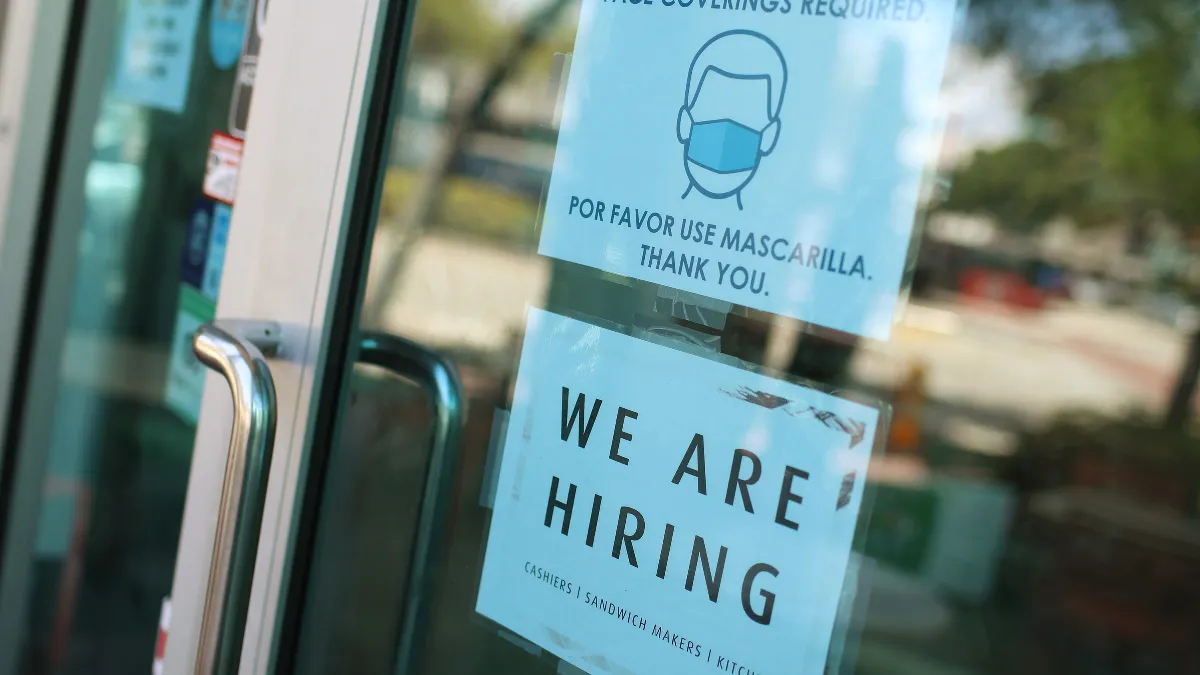Dive Brief:
- Despite "elevated" unemployment in the U.S., organizations have had difficulties finding talent, particularly for blue-collar and manual service jobs in industries such as construction, transportation, manufacturing and retail, according to a research report published last month by The Conference Board.
- Forty-four percent of organizations surveyed in April by the National Federation of Independent Businesses said they had job openings they were unable to fill, per The Conference Board, while other studies found "rapid" growth in the number of job advertisements posted in recent months. Some workers "may be slow to re-enter the workforce" due to the impact of the pandemic on health, safety, caregiving, family needs and unemployment benefits, the report said.
- Though present labor shortages may ease by the end of 2021, the labor market could tighten once more by the end of 2022 due to a potential economic recovery, The Conference Board said. The organization noted that the U.S. working-age population is shrinking over time, in part due to the retirement of baby boomers.
Dive Insight:
As the push for vaccinations continues, the U.S. job market is still recovering from the impact of lockdowns that have persisted since 2020. In March, the nation had 8.1 million job openings, a series high dating back to 2000, according to the U.S. Bureau of Labor Statistics.
The causes of the current labor shortage have been debated across the ideological spectrum. Potential catalysts include workers' health and safety concerns, but employment experts also debate the role of pandemic-related unemployment assistance benefits and a general lack of workers with specific skill sets, sources previously told HR Dive.
U.S. organizations also are contending with slow population growth, which could further drive wage increases and employment costs, according to a May study published by economic and data analytics firm Emsi.
The Conference Board cited BLS data showing a sharp increase in wage and salary growth during the first quarter of 2021, "the fastest quarterly growth rate in 20 years," it said. Wage increases have been particularly elevated in the leisure and hospitality sectors, as well as in the blue-collar and manual service occupations. That mirrors employer actions before the pandemic; in the second quarter of 2019, for example, ADP Research Institute said U.S. wages had grown 4% year-over-year amid ongoing labor shortages.
In addition to raising wages, employers may be able to adopt any number of recruiting practices to help weather the current market, The Conference Board said. For example, employers could add or modify referral programs, contract with staffing firms and expand hiring pools to include remote workers. There also may be opportunities to reassess prior experience requirements and job advertisements to better reflect the skills and competencies employers need, per the report.
Employers in service industries have already adopted unique hiring strategies in response to tight talent markets. Pizza chain Donatos last month began a series of "dinnerview" events in which candidates could participate in walk-in interviews, potentially receive a job "on the spot" and receive a certificate for a free pizza.











